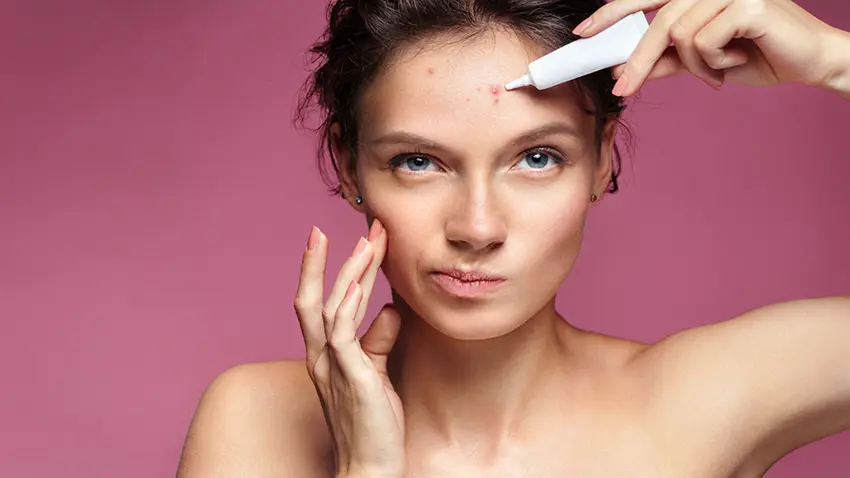Let’s face it, dealing with acne can feel like an endless battle. Whether you’re waking up to a fresh breakout before an important event or struggling with persistent pimples that just won’t quit, acne has a way of shaking our confidence. But what if I told you that some of the best solutions might already be in your kitchen? Yep, the natural world offers us a treasure trove of remedies that not only work but also pamper your skin without the harsh side effects of conventional treatments. In this guide, we’ll dive into these natural remedies for acne and show you how to incorporate them into your daily routine.
Table of contents
What Causes Acne? A Closer Look
Before diving into the Natural Remedies for Acne, it’s crucial to understand what’s going on beneath the surface of your skin. Acne isn’t just about the occasional pimple—it’s the result of a complex process happening within your pores. When your skin’s sebaceous glands kick into overdrive, they produce an excess of oil (sebum). This oil, combined with dead skin cells, can clog your pores, creating a cozy environment for bacteria like Cutibacterium acnes to thrive. The result? Inflammation, redness, and those pesky breakouts.
Factors such as fluctuating hormones, stress, dietary choices, and even genetics can all contribute to how and when acne appears. But don’t worry—there are plenty of natural ways to regain control and restore balance to your skin.
Top Natural Remedies for Acne
Best natural oils for acne treatment
Tea Tree Oil
Tea tree oil is one of the well-known natural remedies for acne due to its antimicrobial and anti-inflammatory properties. Studies have shown that it can be as effective as benzoyl peroxide, a common acne treatment, in reducing the number and severity of acne lesions.
How to Use: Mix a couple of drops with a carrier oil like jojoba or coconut oil (trust me, straight tea tree oil can be a bit too intense). Dab it on your blemishes twice daily, and let nature do its magic.
Did You Know? Tea tree oil has been used by indigenous Australians for centuries to treat cuts and wounds due to its powerful antiseptic properties.
Always perform a patch test before applying tea tree oil to your face to avoid irritation.
Jojoba Oil
Here’s a little secret: jojoba oil isn’t really an oil at all—it’s a liquid wax. But that’s what makes it so unique! It closely mimics our skin’s natural oils, helping to balance out sebum production. Plus, it’s a gentle healer, soothing inflammation and promoting the healing of acne wounds.
How to Use: After cleansing, massage a few drops into your skin. It’s lightweight, so it works beautifully as a moisturizer, especially before bed.
Fun Fact: Jojoba oil’s chemical structure is so similar to human sebum that it’s often used to trick the skin into thinking it has produced enough oil, thereby reducing overproduction.
Rosehip Oil
Rosehip oil is like the unsung hero of the natural skincare world. Packed with essential fatty acids and vitamins A and C, this oil is a dream for anyone dealing with inflammatory acne and scarring. Not only does it help regulate oil production, but it also encourages cell turnover and fades those pesky dark spots, making it one of the most effective Natural Remedies for Acne.
How to Use: Gently press a few drops into your skin after cleansing and before your moisturizer. It’s best used at night to let its magic work while you sleep.
Pro Tip: To maximize its benefits, consider storing rosehip oil in the fridge. The cool temperature not only preserves the oil but also provides a soothing effect when applied to inflamed skin.
DIY Acne Masks
Honey Mask
Let’s talk about honey—nature’s sweet nectar that’s also a skin savior. Honey, especially raw or manuka honey, is a natural antibacterial agent that can zap those acne-causing bacteria. Plus, it’s super hydrating, making it perfect for skin that’s been dried out by other treatments.
How to Use: Use honey as a face mask by mixing it with ground oatmeal. Apply the mixture to your face, leave it on for 15-20 minutes, and then rinse off with warm water. Honey not only combats acne bacteria but also hydrates and soothes the skin.
Cultural Insight: In ancient Egypt, honey was considered sacred and was used in skincare routines to keep the skin youthful and blemish-free.
Aloe Vera Gel
Remember that time you got sunburned, and someone handed you a bottle of aloe vera? Well, it’s not just for burns. Aloe vera is one of the best natural remedies for acne that’s loaded with salicylic acid and sulfur, two acne-fighting ingredients that help reduce inflammation and soothe irritated skin.
How to Use: Scoop out fresh aloe vera gel from the plant (or use a pure, store-bought version) and apply it directly to your skin. Let it sit for 10-15 minutes before rinsing. Your skin will thank you.
Pro Tip: For an extra cooling effect, store your aloe vera gel in the fridge before applying it. It’s a refreshing way to start or end your day.
Turmeric Mask
Turmeric isn’t just for curry—it’s a skincare powerhouse too! With its active compound curcumin, turmeric reduces redness and fights the bacteria that can cause breakouts. Plus, it gives your skin a nice glow (just be careful, it can stain!).
How to Use: Mix turmeric with honey or yogurt to create a paste. Apply it to your face, leave it on for 15-20 minutes, and rinse off. Use it 2-3 times a week, and watch your skin transform.
Fun Fact: In Indian weddings, brides often use turmeric masks before their big day to give their skin a radiant glow.
Toners and Astringents
Witch Hazel
Witch hazel might sound like something out of a fairytale, but it’s a real deal in skincare. It’s an astringent that helps tighten pores, control oil, and calm inflammation. It’s especially great for oily or combination skin.
How to Use: After cleansing, soak a cotton pad with witch hazel and swipe it across your face. It’s an excellent pre-step before applying your favorite serums and moisturizers.
Did You Know? Witch hazel was a staple in Native American skincare, used to treat wounds and reduce swelling.
Apple Cider Vinegar
Apple cider vinegar is like that one friend who’s good at everything. It balances your skin’s pH, kills bacteria, and even works as an exfoliant to clear away dead skin cells.
How to Use: Dilute one part apple cider vinegar with three parts water (it’s potent stuff). Use a cotton ball to apply it to your skin, let it sit for a few minutes, and then rinse it off.
Pro Tip: Apple cider vinegar can be harsh on the skin, so always do a patch test first. If it feels too strong, try diluting it even more.
Green Tea Toner
If you’re a fan of green tea, your skin is about to be a fan too. Rich in antioxidants, green tea helps soothe your skin and reduce excess oil. Plus, it’s incredibly refreshing!
How to Use: Brew some green tea, let it cool, and then use a cotton pad to apply it to your skin. You can even mix it with honey for an extra boost.
Cultural Insight: Green tea has been used in traditional Chinese medicine for centuries to detoxify the body and clear the skin.
Dietary Supplements and Changes
Zinc Supplements
Zinc is one of those under-the-radar minerals that does wonders for your skin. It helps reduce inflammation and regulates oil production, making it a great supplement for those struggling with acne.
How to Use: Always consult with a healthcare professional before starting supplements. Typically, 30-40 mg per day is the sweet spot, but everyone’s different, so get that expert advice first.
Did You Know? Zinc deficiency is linked to severe acne, so ensuring you’re getting enough might just be the key to clearer skin.
Dietary Changes
Your diet plays a bigger role in your skin’s health than you might think. High-glycemic foods and processed sugars can trigger breakouts, so swapping them for fresh fruits, veggies, and lean proteins can make a world of difference.
How to Implement: Focus on whole foods, and try to avoid sugary drinks and snacks. Your skin (and your waistline) will thank you.
Pro Tip: Incorporating foods rich in Omega-3 fatty acids, like salmon or walnuts, can help reduce inflammation and improve your skin’s overall health.
Important Tip: Hands Off!
As tempting as it might be, resist the urge to touch or pop your acne. Picking at your pimples can introduce more bacteria to the area, worsening inflammation and potentially leading to scarring. Plus, squeezing a pimple can push bacteria deeper into the skin, causing even more breakouts down the line. So, keep your hands off and let your skin heal naturally!
Potential Risks and Side Effects
While these natural remedies for acne are generally safe, it’s always good to remember that everyone’s skin is different. Patch tests are your best friend—especially if you have sensitive skin. And if something doesn’t feel right, trust your instincts and stop using it. There’s no one-size-fits-all when it comes to skincare.
FAQs for Natural Remedies for Acne
1. Can natural remedies completely cure acne?
- While natural remedies can significantly improve acne symptoms, they may not completely cure the condition, especially in severe cases. It’s important to combine natural treatments with a consistent skincare routine and, if necessary, consult a dermatologist.
2. How long does it take to see results from natural acne treatments?
- Results can vary depending on the individual and the severity of the acne. Most natural remedies take at least four weeks to show noticeable improvements. Consistency is key to achieving the best results.
3. Are there any side effects to using natural remedies for acne?
- Natural remedies are generally safe, but some individuals may experience side effects like skin irritation or allergic reactions. Always perform a patch test before using any new treatment and consult with a healthcare provider if you have concerns.
4. Can I use multiple natural remedies for acne at the same time?
- Yes, but it’s important to introduce one remedy at a time to monitor how your skin reacts. Overloading your skin with too many products at once can lead to irritation.
5. Are natural remedies effective for all skin types?
- Most natural remedies are suitable for all skin types, but it’s important to choose the right ones for your specific skin needs. For example, those with sensitive skin should be cautious with potent ingredients like tea tree oil or apple cider vinegar.
Conclusion
Natural remedies for acne aren’t just effective—they’re also a way to reconnect with simpler, more holistic skincare practices. They may take a bit longer to show results compared to over-the-counter treatments, but the payoff is worth it. Plus, there’s something satisfying about using ingredients that are as kind to your skin as they are to the planet. So whether you’re slathering honey on your face or sipping green tea while applying it as a toner, know that you’re treating your skin to the best nature has to offer.
Remember, consistency and patience are key. What works for one person might not work for another, so don’t be afraid to mix and match until you find your perfect skincare recipe. And if your acne is particularly stubborn, a dermatologist can help you combine these natural remedies with professional treatments for the best results.
Have you tried any of these natural remedies for acne? We’d love to hear about your experiences in the comments below! And if you’re hungry for more natural skincare tips, make sure to subscribe to our newsletter. Let’s make your skincare journey as smooth and glowing as your future complexion.
Related Posts:
7 Best DIY Face Masks for Hydration, Brightening, and Acne
Makeup for Acne-Prone Skin: Top Tips and Product Recommendations

